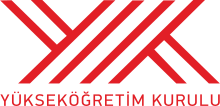Council of Higher Education (Turkey)
| Yükseköğretim Kurulu | |
 | |
| Agency overview | |
|---|---|
| Formed | 1981 |
| Type | Education |
| Jurisdiction | Turkey |
| Headquarters | Çankaya, Ankara |
| Annual budget | ₺95.630.000 [1] |
| Website | yok |
The Council of Higher Education (Turkish: Yükseköğretim Kurulu, YÖK; also translated as Higher Education Board) is responsible for the supervision of universities in Turkey, in a capacity defined by article 130 of the 1982 constitution.[2] The current president of the council is Erol Özvar, a former professor of the Marmara University and was appointed by Recep Tayyip Erdoğan.[3]
Organisation[edit]
On the 24 members seven are nominated by the president of Turkey, seven by the Inter University Council, seven by the Council of Ministers, one by the Armed Forces and two by the Ministry of Education.[2] All nominations had to be confirmed by the president of Turkey.[2] The main task of the YÖK is to receive and approve the budgets from the Universities and suggest people to a University rectorship to the president.[2] The YÖK also receives reports from the Universities and their performances.[2]
A Higher Educational Supervisory Council supervises the universities and consists of ten members.[2] Of the five members from the YÖK, one is appointed by the Ministry of Education, one by the Armed Forces, one by the Supreme Court, another from the State Accounting Bureau and one by the Council of State.[2]
History[edit]
The YÖK was founded in the immediate aftermath of the 12 September 1980 coup d'état, which established military rule. It reorganised education along strict military lines and throughout the 1980s, professors were encouraged to instill the values of family, nationalism and 'Turkishness' in the students, who were urged to put patriotic duties and responsibilities into practice.[4]
In 1992, the YÖK established a scholarship program to be able assign qualified professors to the 24 newly established Universities outside of the cities Ankara, Izmir and Istanbul.[5] It selected students to study abroad who in exchange would teach at Turkish universities for the double amount of years their studies abroad were supported.[5] The program was initiated by Mehmet Sağlam, the president of the YÖK at the time.[5]
See also[edit]
- Turkish Academy of Sciences (TÜBA)
- Scientific and Technological Research Council of Turkey (TÜBİTAK)
References[edit]
- ^ "TBMM Tutanak Müdürlüðü". www.tbmm.gov.tr.
- ^ a b c d e f g Gedlkoğlu, Tokay (1995). "Changing Models of University Government in Turkey". Minerva. 33 (2): 164. ISSN 0026-4695. JSTOR 41820968.
- ^ "President appoints Marmara University rector as YÖK chair - Türkiye News". Hürriyet Daily News. Retrieved 2022-10-30.
- ^ Freely, Maureen (September 2012). "Crossing the Line". Index on Censorship. 41 (3): 56–65. doi:10.1177/0306422012456477. ISSN 0306-4220. S2CID 148073684.
- ^ a b c Mathews, Julie (2007). "Predicting International Students' Academic Success... May Not Always Be Enough: Assessing Turkey's Foreign Study Scholarship Program". Higher Education. 53 (5): 645–673. doi:10.1007/s10734-005-2290-x. hdl:11693/23588. ISSN 0018-1560. JSTOR 29735077. S2CID 144932507.
External links[edit]
